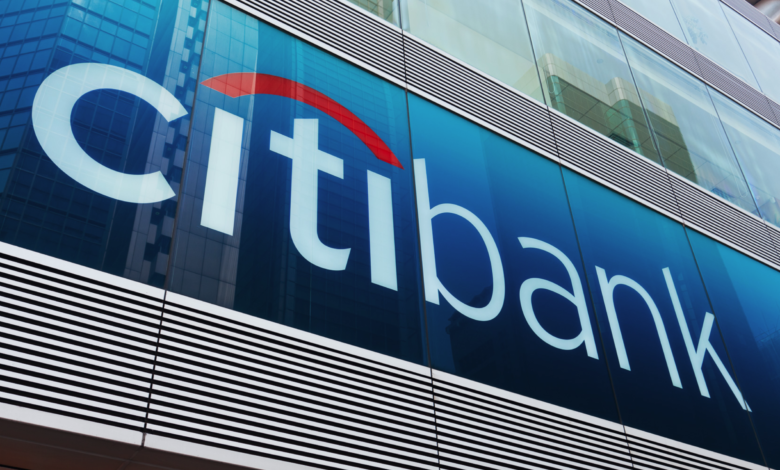Citi Bank Net Worth: How Much Is the Bank Worth?

Citibank is a division of Citigroup, one of the largest banks in the U.S., boasting $21 trillion in assets under custody and a market cap of $83.72 billion.
Citi Bank Net Worth
Citibank’s net worth was approximately $327.08 billion at the end of 2021, based on its full-year revenue and profits from the previous three years.
While market capitalization indicates how the market values a company, it isn’t entirely precise since it is influenced by investor sentiment, which fluctuates frequently.
In contrast, the GOBankingRates Evaluation calculates a company’s net worth using tangible figures such as assets and revenue. Unlike market value, this approach considers the company’s full-year profits and revenue over the past three years, along with its assets and liabilities.
Citigroup’s Financial Position
According to its earnings statement, in 2021, Citigroup reported a net income of approximately $22 billion on $71.9 billion in revenue, compared to $11 billion in net income on $75.5 billion in revenue for 2020. As 2022 approached, CEO Jane Fraser reiterated Citibank’s commitment to a strategy focused on exiting weaker markets.
Citibank’s Blunders
In 2020, Citibank made what a U.S. District Court judge described as “one of the biggest blunders in banking history” by mistakenly wiring $900 million to Revlon lenders instead of the intended $8 million.
Just two months later, Citigroup was fined $400 million by the Federal Reserve and the Office of the Comptroller of the Currency for its “longstanding failure to establish risk management,” according to The New York Times.
These legal troubles highlight significant liabilities for Citibank, despite its valuation. Analysts agree that Citibank’s growth has been eclipsed by other major banks like JPMorgan Chase, Bank of America, and even Wells Fargo, which has faced its substantial legal challenges.
Recent Moves and Financial Performance of Citigroup
Recent strategic exits for Citigroup include the profitable sale of its consumer business in the Philippines and the loss-making sale of its consumer business in Australia. Additionally, the company plans to cease operations in Russia by the end of 2022.
In its earnings report for the third quarter of 2022, Citigroup disclosed a 25% decrease in net income compared to the same quarter the previous year. This decline was attributed to higher expenses and increased credit costs in its Personal Banking and Wealth Management division. However, the company also reported a 6% increase in revenues, reaching $18.5 billion, which exceeded analysts’ expectations, according to CNBC.
Despite the challenges, Citigroup returned $1 billion to shareholders, demonstrating its strong cash position. Although Citi shares have dropped nearly 29% year to date, they experienced a slight uptick following the release of the financial results.
Keep reading to explore other factors that investors should consider when deciding whether to invest in Citibank stock.
Citibank’s CEOs
Michael Corbat, the former CEO of Citigroup, retired in February 2021. The board of directors appointed Jane Fraser as his successor, marking her as the first female CEO in the company’s history.
Fraser joined Citi’s Corporate and Investment Banking division in 2004 and steadily advanced through the ranks. She served as CEO of U.S. Consumer and Commercial Banking and CitiMortgage, CEO of Citigroup Latin America, and president of Citi and CEO of the Global Consumer Bank, which oversees all of Citi’s consumer businesses, before assuming her current role.
In 2021, Fraser’s total compensation was $20,541,324. This included $9.25 million in salary and bonuses, $11.22 million in equity, and $79,718 in other compensation, according to Salary.com.
Citibank Is Investing Billions in Technology
While Citi® was not the first bank to introduce ATMs, it was among the pioneers in heavily investing in them. In 1977, Citi launched its first ATM in Queens and invested over $100 million to install a network of ATMs across New York City. By 2022, Citi had expanded to more than 62,000 ATMs and over 600 locations worldwide.
Citi remains at the forefront of technological advancements, including 5G, mobile, and digital payments. In 2020, Citibank announced that innovations in technology and automation are projected to save the company $600 million.
Citibank Sets Its Sights on Net Zero Emissions
On January 19, Citibank announced its ambition to lead the transition to a net zero global economy. The bank committed to achieving net zero greenhouse gas emissions in its own operations by 2030 and globally by 2050. Additionally, Citi aims to reduce financed emissions in its Energy and Power loan portfolios by 29%, using 2020 as the baseline year.
FAQs on Citibank Net Worth
1. What is Citibank’s net worth?
Citibank is part of Citigroup, which had assets worth $21 trillion under custody as of its latest reports.
2. How does Citibank’s net worth compare to other banks?
Citigroup, with a market capitalization of $83.72 billion, ranks among the largest banks in the United States by assets under management.
3. How does Citibank’s net worth impact its operations?
Citibank’s substantial net worth provides a strong financial foundation, enabling it to navigate global markets and pursue strategic initiatives such as technological advancements and sustainable practices.
Conclusion
Citibank’s substantial net worth underscores its robust position in the banking industry. With assets totaling $21 trillion under custody and a market capitalization of $83.72 billion, Citibank is positioned as one of the leading banks in the United States. This financial strength not only supports its operational stability but also facilitates strategic investments in technology, sustainable practices, and global expansion efforts. As Citibank continues to navigate evolving market conditions and challenges, its significant net worth remains a cornerstone of its resilience and growth trajectory in the financial sector.




